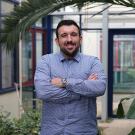
What was your background before joining ENSTA Bretagne?
After studying law, languages and political science, I did my thesis at the University of Montpellier on the outsourcing policy in the armed forces and the reform of the State under Nicolas Sarkozy. I was interested in the various support activities for the armed forces, in particular collective catering and aeronautical maintenance. Through my research, I was able to question the outsourcing of certain activities to the private sector and thus understand the difficulties that these projects may have encountered. My thesis is still useful to me today through the knowledge I acquired of the armed forces.
How does the article that led to your award by the Foundation echo the TRAVID project that you led with Jean Frances?
TRAVID (Travail vivant d’innovation de défense – Living work of Innovation of Defense) is a school project that I led with Jean Frances, a professor in sociology at ENSTA Bretagne, up to December 31, 2022. For this sociological study, we chose to conduct a "bottom-up" approach, in that we studied how the military themselves propose certain innovations based on their own experiences.
During this research project, we looked at the conditions for developing innovations devised "by and for" the military, which often involve their equipment and weapons. Through the study of these innovation trajectories, our goal is to understand how the military attempts to improve their working conditions and tools.
For this study, we focused our research on the Special Forces by visiting several units in France. By tracing the trajectory of these innovations from the idea stage to "scaling up", through prototyping and certification, we seek to understand how the military innovates in its daily work, with which services it interacts, and whether it encounter difficulties. We are currently writing a report intended for the AID (Agence de l’Innovation Défense -Defense innovation agency) with our recommendations.
What does the ID2I school project involve?
The post-doctorate that I started at the beginning of 2023 involves the ID2I (Innovation of Defense, Defense of Innovation) research project that I'm leading with Jean Frances between ENSTA Bretagne and AID up to December 2025. Unlike the TRAVID project, it involves more the Political Science field. This time, the research is carried out through a "top-down" approach insofar as we are looking at the way in which innovation is understood by political players and the administration.
Our aim is to understand how innovation has become a public policy matter and how it is considered? This involves analyzing the mechanisms implemented by the Ministry of the Armed Forces to encourage innovation. Eventually, the idea is to have TRAVID interact with ID2I with the aim of combining the top-down approach with the bottom-up approach to refine the research.
What is your article entitled "L’innovation technologique, le nouveau nerf de la guerre ?" ("Technological innovation, the new lifeblood of war?") about?
This year, the theme of the Foundation for Social Sciences was "Un monde en guerre ?" ("A world at war?"). On this occasion, I proposed an article related to my research in TRAVID and also in connection with ID2I. My aim is to question innovations in waging war and to shed light on so-called "participatory" innovations, developed "by the military and for the military."
We can now hear strong speeches about "cutting edge" technological innovation and the "augmented" soldier of the future. But, as illustrated by the creation of a mobile mapping application for artillerymen in Ukraine, soldiers are also required, in order to fight, to develop a whole range of more technical innovations on a daily basis. The innovations I observe are therefore often less impressive than could be imagined, and further away from the image one might have of "the war of the future". The military is sometimes keen to maintain a certain "ruggedness" in the tools they develop and use, and it is this relationship to technology that I question in this upcoming article.
How does this award affect your work?
This award is a good way to leverage research activities and in particular research activities in Human and Social Sciences at ENSTA Bretagne. This allows the school to influence defense policies.
For my part, this award implies working meetings with the Foundation of Social Sciences and the inclusion of a network with researchers specialized in other disciplines. I will have to write a chapter in a collective book, produce a scientific article and also make a video to promote my research activities. It is very formative, since the foundation will teach me a number of things and support me throughout this process.
I'm very proud to contribute to the visibility and dissemination of research on defense topics at ENSTA Bretagne. This award reinforces my desire to work in research and higher education.





















